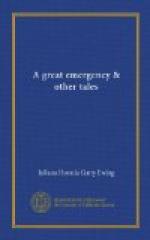I could not very well speak, but I turned round and began to walk in the direction of the dock gates. Mr. Rowe behaved uncommonly kindly. He said nothing more, but turned as if I had given the word of command, and walked respectfully just behind me. I resolved not to look back, and I did not. I was quite determined too about one thing: Mr. Rowe should never be able to say he had seen me make a fool of myself after I had made up my mind. But in reality I had very hard work to keep from beginning to cry, just when Fred was beginning to leave off.
I screwed up my eyes and kept them dry, however, but as we went through the gate there came in a sailor with a little bundle like ours, and a ship’s name on his hat. His hat sat as if a gale were just taking it off, and his sea-blue shirt was blown open by breezes that my back was turned upon. In spite of all I could do one tear got through my eyelashes and ran down, and I caught it on my lips.
It was a very bitter tear, and as salt as the salt, salt sea!
CHAPTER XIV.
A GLOW ON THE HORIZON—A FANTASTIC PEAL—WHAT I SAW WHEN THE ROOF FELL IN.
It was the second day of our return voyage. Mr. Rowe had been very kind, and especially so to me. He had told us tales of seafaring life, but they related exclusively to the Royal Navy, and not unfrequently bore with disparagement on the mercantile marine.
Nowhere, perhaps, are grades of rank more strongly marked with professional discipline and personal independence better combined than in the army and navy. But the gulf implied by Mr. Rowe between the youngest midshipman and the highest seaman who was not an officer was, I think, in excess of the fact. As to becoming cabin-boy to a trading vessel in hopes of rising to be a captain, the barge-master contrived to impress me with the idea that I might as well take the situation of boot and knife cleaner in the Royal Kitchen, in hopes of its proving the first step towards ascending the Throne.
We seemed to have seen and done so much since we were on the canal before, that I felt quite sentimental as we glided into Linnet Flash.
“The old place looks just the same, Barge-master,” said I with a travelled air.
“So it do, sir,” said Mr. Rowe; and he added—“There’s no place like Home.”
I hardly know how near we were to the town, but I know that it was getting late, that the dew was heavy on the towing-path, and that among the dark pencilled shadows of the sallows in the water the full moon’s reflection lay like a golden shield; when the driver, who was ahead, stepped back and shouted—“The bells are ringing!”
When we got a little nearer we heard them quite clearly, and just when I was observing a red glow diffuse itself in the cold night sky above the willow hedge on our left, Mr. Rowe said, “There must be a queer kind of echo somewhere, I heard sixteen bells.”




